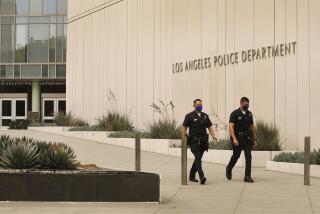Activists protest release of suspects’ names in sex sting
A Los Angeles gay rights organization has protested the decision by Manhattan Beach police to release — and many local media to publish — the names and photos of 18 men arrested in an undercover sex sting at a public restroom.
Leaders of the Los Angeles Gay & Lesbian Center contended that last week’s release of the mug shots, names and birth dates of the men could lead to public humiliation and more severe consequences.
The social service agency said one of the arrestees had reported to them that a fellow suspect attempted suicide after the results of the sting were made public. A center official said Monday that he had no additional details about the suicide report.
Manhattan Beach Police Chief Eve Irvine said Tuesday that the release of suspects’ photos was standard operating procedure. “This is consistent with our practice,” Irvine said. “It was never our intention to humiliate anyone, whether they are heterosexual or homosexual.”
The case and the coverage it has received have set off spirited discussion on several news sites. Some argued that the arrests and publicity will be useful in dissuading others who might want to procure sex in a public place. Others said the attention given to the suspects, who have not been charged, echoed the public shaming visited on gays in decades past.
Jim Key, chief spokesman for the Gay & Lesbian Center, said the Manhattan Beach Police Department could have worked with the center to try to stop men from meeting in the restroom, located beside the beach at the foot of Marine Avenue. Key said the Los Angeles Police Department took the public education approach, rather than mass arrests, to cut down on a public sex problem at Griffith Park.
Irvine said she would meet with representatives of the Gay & Lesbian Center later this week and is open to working with the organization if suspicions arise in the future that public facilities have been turned into meeting places for sex. “Anything we can do to prevent this kind of activity from occurring, fine, that works for us,” Irvine said.
Darrel Cummings, the center’s chief of staff, said news organizations should also use more discretion before identifying suspects in what he called a victimless crime.
“Naturally we don’t condone illegal activity of any kind,” Cummings said in a statement, “but these men haven’t been proven guilty, and historically, charges such as those leveled against them have involved police entrapment. Publishing their photos serves no purpose other than to humiliate and destroy their lives.”
The activist organization suggested that Manhattan Beach may have publicized the arrests because of the suspects’ sexual orientation. City Atty. Roxanne Diaz joined the police chief in denying that assertion.
Although such photos may be released in other cities as a deterrent, Irvine said that was not the motivation in Manhattan Beach. She said the department began regularly releasing photos in criminal cases some time ago, because they were routinely requested by the media and others.
“To cut down on the red tape and bureaucracy, we sent them out regularly. We were very consistent,” said Irvine, who added that the practice began before she became chief 10 months ago.
Key argued that police departments in some major cities are less likely to release photos and that Manhattan Beach should exercise more discretion.
Among the media that displayed at least some of the photos were the Torrance-based Daily Breeze newspaper; the alternative LA Weekly newspaper; KCBS-TV Channel 2; KNBC-TV Channel 4; KTLA-TV Channel 5, the latter owned by Tribune Co., which also owns the Los Angeles Times; and KCAL-TV Channel 9. The Times did not write an article on the arrests, but the newspaper posted KTLA’s video of the story online. The Huffington Post’s “Gay Voices” page did not run the names or photos of the arrestees, but the site posted the KNBC video, which showed several of the suspects’ mug shots.
Representatives of the outlets that covered the story defended the publication of the photos. One Daily Breeze journalist, who declined to be identified while speaking without clearance from management, said the paper often publishes mug shots with crime stories.
“Why wouldn’t we use them? We run mugs all the time when the police release them to us, both misdemeanor and felony,” said the journalist. “Now we are supposed to protect some people, but not others?”
An LA Weekly blog post put the onus on the Police Department for the photos entering the public domain. Writer Simone Wilson said Manhattan Beach police “sentenced the mug shots to eternal life as soon as it threw them to the undiscerning Internet.”
Kevin Cody, the veteran editor and publisher of the Easy Reader, bucked the trend. The alternative weekly did not run the pictures of the men, who ranged in age from 20 to 59.
More to Read
Sign up for Essential California
The most important California stories and recommendations in your inbox every morning.
You may occasionally receive promotional content from the Los Angeles Times.











